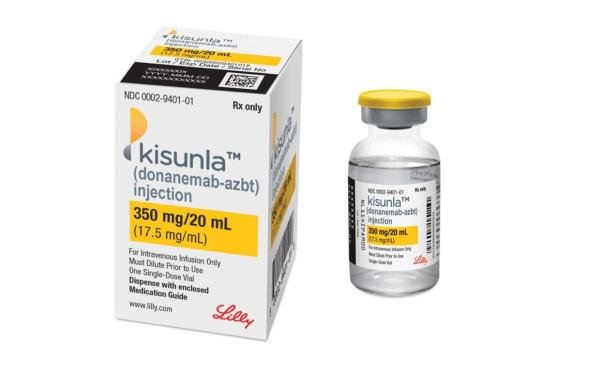Kisunla Side Effects
Generic name: donanemab
Medically reviewed by Drugs.com. Last updated on Sep 10, 2024.
Note: This document provides detailed information about Kisunla Side Effects associated with donanemab. Some dosage forms listed on this page may not apply specifically to the brand name Kisunla.
Applies to donanemab: parenteral injection concentrate.
Important warnings
This medicine can cause some serious health issues
-
Amyloid Related Imaging Abnormalities
- Monoclonal antibodies targeting aggregated forms of beta amyloid, such as donanemab, can cause amyloid-related imaging abnormalities (ARIA), including ARIA with edema (ARIA-E) and ARIA with hemosiderin deposition (ARIA-H).1
- ARIA typically presents without symptoms, but can cause rare, life-threatening events such as intracerebral hemorrhages >1 cm.1
- ARIA-E may also present with focal neurologic deficits that mimic ischemic stroke; consider whether such symptoms can be due to ARIA-E prior to administering thrombolytic therapy in patients being treated with donanemab.1
- Patients who are apolipoprotein E ε4 (ApoE ε4) homozygotes have a higher incidence of ARIA, including symptomatic and serious cases, than heterozygotes or noncarriers.1
- Test for ApoE ε4 status before starting treatment to assess risk of ARIA.1
- Before testing, discuss genotype-related ARIA risk and the implications of genetic results with the patient.1
- Consider benefit of treatment versus risk of ARIA when deciding whether to treat with donanemab.1
Side effects include:
Most common adverse reactions (≥10% incidence compared to placebo): ARIA-E, ARIA-H microhemorrhage, ARIA-H superficial siderosis, headache.
See also:
For healthcare professionals
Applies to donanemab: intravenous solution.
General adverse events
The most frequently reported side effects included amyloid related imaging abnormalities-hemosiderin deposition (ARIA-H) microhemorrhage, ARIA-H superficial siderosis, ARIA-edema (ARIA-E), and headache. The most common side effect resulting in discontinuation was infusion-related reaction.[Ref]
Gastrointestinal
- Uncommon (0.1% to 1%): Intestinal obstruction, intestinal perforation[Ref]
Hypersensitivity
- Common (1% to 10%): Hypersensitivity reactions (including anaphylaxis)[Ref]
Immunologic
- Very common (10% or more): Developed antidrug antibodies (87%), developed neutralizing antibodies (87%)[Ref]
About 10% of patients who developed antidrug antibodies while taking this drug reported infusion-related reactions.[Ref]
Nervous system
- Very common (10% or more): ARIA-H microhemorrhage (25%), ARIA-E (24%), ARIA-H superficial siderosis (15%), headache (13%)[Ref]
Patients have had both microhemorrhage and superficial siderosis.[Ref]
Other
- Common (1% to 10%): Infusion-related reactions[Ref]
References
1. (2024) "Product Information. Kisunla (donanemab)." Lilly, Eli and Company
Frequently asked questions
- How do I decide between Leqembi and Kisunla?
- Will insurance cover Kisunla treatment?
- How long will I need to take Kisunla?
- How well does Kisunla work?
- How quickly does Kisunla start working?
- Can Kisunla be used with other Alzheimer's drugs?
More about Kisunla (donanemab)
- Check interactions
- Compare alternatives
- Pricing & coupons
- Drug images
- Dosage information
- During pregnancy
- FDA approval history
- Drug class: miscellaneous central nervous system agents
- En español
Patient resources
Professional resources
Related treatment guides
Further information
Kisunla side effects can vary depending on the individual. Always consult your healthcare provider to ensure the information displayed on this page applies to your personal circumstances.
Note: Medication side effects may be underreported. If you are experiencing side effects that are not listed, submit a report to the FDA by following this guide.

